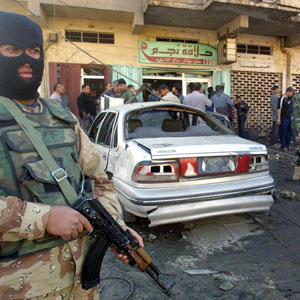
An Iraqi security members guard the site where a suicide car bomb detonated in Al-Mashtel district south east of Baghdad on Tuesday, 14 November 2005 (EPA)
BAGHDAD, Iraq (AP) – U.S. and Iraqi forces swept through most of an insurgent stronghold near the Syrian border, encountering pockets of fierce resistance, destroying five unexploded car bombs and killing at least 30 guerrilla fighters, the U.S. command reported.
Three U.S. Marines died during the last two days of the operation to clear the town of Obeidi, a military statement said. More than 80 insurgents have been killed, mostly in airstrikes, in the same period, it said.
Separately, three U.S. Army soldiers were killed Tuesday in a roadside bombing near Baghdad, the U.S. command said.
"Intelligence reports indicate that the strong resistance to the Iraqi and coalition push into the city is due in large part to the fact that insurgents believe they are trapped and have nowhere else to go," the military report said of the border operation. "Several detainees were captured trying to sneak out of the area by crawling among a flock of sheep."
The U.S.-Iraqi attack on Obeidi was the latest stage of an offensive to clear al-Qaida-led insurgents from towns and cities in the Euphrates River valley near the border with Syria and seal off an infiltration route for foreign fighters sneaking into Iraq.
"Iraqi and coalition forces continue to clear the city house-by-house, occasionally encountering buildings that are rigged with explosives," the U.S. statement said. It said many weapons caches were seized, including several that contained suicide vests and bomb-making materials.
Earlier this month, U.S. and Iraqi forces overran two other towns in the area, Husaybah and Karabilah. The Americans and their Iraqi allies plan to establish a long-term presence to prevent insurgents from returning.
One Marine assigned to Regimental Combat Team 2, 2nd Marine Division died Tuesday from wounds incurred from a bomb that exploded Monday. Another Marine from the same unit died Monday from a roadside bomb in Obeidi, and a third Marine from the unit was killed by small arms fire Monday, the military said.
The three soldiers who died Tuesday were from the Army”s Task Force Baghdad and were killed northwest of the capital, the military said.
That brought to at least 2,071 the number of U.S. service members who have died since the beginning of the Iraq war in March 2003, according to an Associated Press count.
U.S. officials have said the Euphrates Valley campaign is also aimed at encouraging Sunni Arabs to vote in the Dec. 15 parliamentary elections without fear of insurgent reprisals. The Bush administration hopes a successful election will encourage many in the Sunni community to abandon the insurgency.
Sunni leaders have repeatedly complained that the Shiite-led government has neglected their interests and that security forces have abused Sunnis.
Prime Minister Ibrahim al-Jaafari confirmed Tuesday that more than 173 Interior Ministry prisoners were found malnourished and possibly tortured by government security forces at a Baghdad lockup.
Al-Jaafari”s comments came a day after an Iraqi Interior Ministry official said an investigation will be opened into allegations that Interior Ministry officers tortured suspects detained in connection with the insurgency.
"I was informed that there were 173 detainees held at an Interior Ministry prison and they appear to be malnourished. There is also some talk that they were subjected to some kind of torture," al-Jaafari told reporters.
Pentagon spokesman Bryan Whitman said U.S. and Iraqi forces went into the facility in Baghdad suspecting that individuals there might not have been appropriately handled or managed, and "they found things that concerned them."
The head of Iraq”s largest Sunni political party said he had spoken to al-Jaafari and other government officials about torture at Interior Ministry detention centers, including the one where the detainees were found.
Mohsen Abdul-Hamid of the Iraqi Islamic Party said the government routinely dismissed his complaints, calling the prisoners "former regime elements."
Also Tuesday, a Pentagon spokesman acknowledged that U.S. troops used white phosphorous as a weapon against insurgent strongholds during the battle of Fallujah last November. The spokesman, Lt. Col. Barry Venable, denied an Italian television news report that the spontaneously flammable material was used against civilians.
Venable said white phosphorous shells are a standard weapon and are not banned by any international weapons convention to which the U.S. is a signatory.
The battle for Fallujah was the most intense and deadly fight of the war, after the fall of Baghdad in April 2003. The city, about 35 miles (55 kilometers) west of Baghdad on the Euphrates River, was a key insurgent stronghold.
In attacks aimed at Iraqi police Tuesday, insurgents opened fire on a police patrol in Kirkuk, 180 miles (290 kilometers) north of Baghdad, killing three, and a roadside bomb a few miles away killed two more police officers, Col. Shirzad Mursi said. The son of an Iraqi contractor was also killed, he added.
In Baghdad, a car bomb exploded while police gathered for a meeting, police Capt. Haider Ibrahim said. Two officers and two other people were killed, he said, and seven people were injured, including two children selling vegetables nearby.

Iraqi Prime Minister Ibrahim al-Jaafari talks to journalists during a press conference in Baghdad, Iraq, Nov. 15, 2005 (AP)

Pigeons fly over one of the minarets of Sunni Um al-Qura mosque in Baghdad, 16 November 2005. Iraq’s government faced calls for an international enquiry into abuse at a secret prison in Baghdad (AFP)
